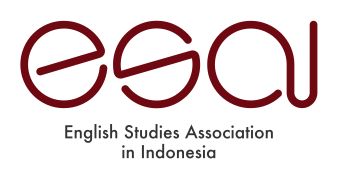An Analysis of the Speech Act of Request by Male and Female Learners of English
Abstract
The speech act of request is a common speech act used in every day interactions. However, because of its nature to impose on other people, it is very important that people select the appropriate strategy in making requests. There are several factors that may influence the production of requests, one of them is the gender of the speaker. This study is an attempt investigate how Indonesian male and female learners of English make English requests.
To collect the data, a questionnaire in the form of a Discourse Completion Test (DCT) is distributed to the respondents. The DCT consists of six scenarios that reflect different social situations, each with different combinations of close / distant social distance, and high / equal / low power between the interlocutors. From this, the respondents are to produce requests based on the different social situations presented in each of the scenarios. The DCT is distributed to students of the English Language and Culture Department at Bunda Mulia University. The total number of respondents is 70 people, which consists of 35 males and 35 females.
The findings of the study reveal that both gender groups employ similar request strategies and modifications throughout the six scenarios, with only slight differences. First of all, the most frequently used request strategy is the query preparatory. This strategy, modified by questions and modals, is the preferred strategy for both male and female students. Additionally, in terms of modifiers, the most preferred downgraders for both gender groups are politeness markers please and supportive reasons. From these request strategies and modifications, it can be said that the females are more indirect than the males in their production of requests.
Keywords: Request, gender, directness
Full Text:
PDFReferences
Blum-Kulka, S. (1982). Learning to Say What You Mean in a Second Language: A Study of the Speech Act Performance of Hebrew Second Language Learners. Applied Linguistics III/1 (pp.29-59).
Blum-Kulka, S. (1987). Indirectness and Politeness in Requests: Same or Different. Pragmatics 11 (pp. 131-146).
Blum-Kulka, S., House, J., and Kasper, G. (1989). Cross-cultural Pragmatics: Requests and Apologies. Norwood, NJ: Ablex.
Blum-Kulka, S. and Olshtain, E. (1984). Requests and Apologies: A Cross-Cultural Study of Speech Act Realization Patterns (CCSARP). Applied Linguistics Vol. 5, No. 3 (pp. 196-213). Oxford University Press.
Brown, P. and Levinson, S.C. (1992). Politeness: Some Universals in Language Usage. Cambridge: Cambridge University Press.
Esmaeili, M. (2011) Written Discourse Completion Test. [07/20/2011]
Hadisantosa, N. (2005). Request Strategies within American Family Interaction: A Case Study. Conference on English Studies: 2 (pp. 71-75). Jakarta: Pusat Kajian Bahasa dan Budaya Universitas Katolik Indonesia Atma Jaya.
Holmes, J. (2008). An Introduction to Sociolinguistics. (3rd ed.). Harlow: Pearson Education Limited.
Jalilifar, A. et al. (2011). A Cross-sectional Study of Iranian EFL Learners’ Request Strategies. Journal of Language Teaching and Research, Vol. 2, No. 4 (pp. 790-803) [07/29/2011]
Janarto, D.K. (2000). Request Strategies by EFL Learners An Interlanguage Pragmatic Study. Jakarta: Program Pascasarjana Universitas Katolik Indonesia Atma Jaya.
Lakoff, R. (1986). You Say What You Are: Acceptability and Gender-Related Language. In Allen, H.B. and Linn, M.D. (Eds.), Dialect and Language Variation (pp. 403-414). London: Academic Press Inc.
Leech, G.N. (1983). Principles of Pragmatics. Harlow: Longman Group Limited.
Nugroho, Ardi. (2012). An Analysis of the Speech Act of Request by Male and Female Students at Bunda Mulia University. Jakarta: Program Pascasarjana Universitas Katolik Indonesia Atma Jaya.
Pearson, J.C. (1985). Gender and Communication. Iowa: Wm. C. Brown Company Publishers.
Rundquist, S. (1992). Indirectness: A Gender Study of Flouting Grice’s Maxims. Journal of Pragmatics, Vol. 18, No. 5 (pp. 431-449).
Trosborg, A. (1995). Interlanguage Pragmatics: Requests, Complaints and Apologies. Berlin, New York: Mouton de Gruyter.
DOI: http://dx.doi.org/10.30813/jelc.v2i2.302
Refbacks
- There are currently no refbacks.



2.jpg)



